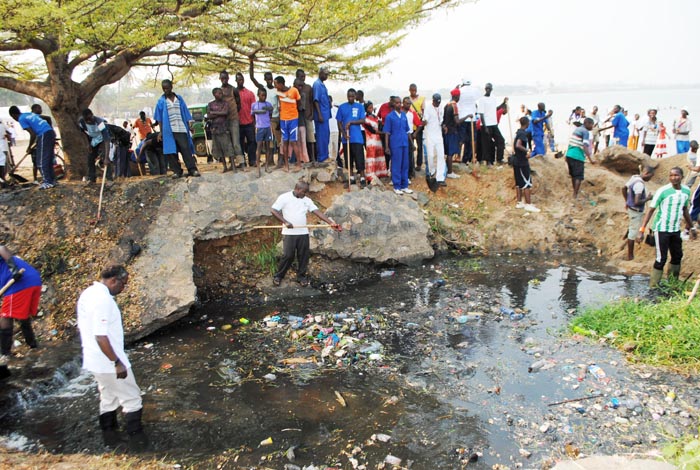On the occasion of the Lake Tanganyika Day, the Ministry of Environment, and other Environmental associations have organized cleaning activities on Lake Tanganyika, at the Global Port side.by Lorraine Josiane Manishatse

The minister of environment and other environmentalists cleanning the lake Tanganyika near the Global Port of Bujumbura.©Iwacu
Studies have shown that the pollution of Lake Tanganyika and waters close to the beach is today a problem in the country, the main cause of the pollution is wastewater leaving gutters to be discharged in the lake. It is then forbidden to use water from Lake Tanganyika as drinking water without adequate treatment. There are even zones where it is not advised to swim.
According to the Minister of Environment, Jean Claude Nduwayo, the Global Port side is the most polluted because it often visited by many people from Bujumbura City Council. It is also threatened by several kinds of pollution, wastewater from households, polluted water from factories and companies, plastic sachets and objects. That is the reason why they have chosen to organize cleaning activities’ sessions on that day.
“Years ago, REGIDESO captured water from the Lake at 1800m, but now because of pollution it is captured at 3000m. If we continue to pollute the Lake which is our main source of water, we will go to buy water expensively in Congo of course, if they don’t pollute it too” he regrets.
For Ambassador Albert Mbonerane the former Chairman of ACVE, some types of fish are now fleeing from Burundi to Congo side because of pollution problems.
Measures to protect the Lake have been taken
The water code is already operational and effectively respected.
“Recently, someone has been caught throwing acid into the lake in order to fish easily. That person has been punished according to the law. I would also like to warn any person who will be caught throwing waste, polluting water or undertaking any activity hostile to the environment will be severely punished. The same warning is addressed to people who fish without permission,” indicates the Minister.
The law against the use and importation of plastic bags has been put in place but not yet been implemented. The National Assembly will soon adopt it. That idea comes because sachets are non-biodegradable. They may last more than 400 years without being decayed naturally if there isn’t any scientific treatment; polluting then the environment very easily.
“I call upon all Burundians to avoid the use of plastic bags” he concludes.















 IWACU Open Data
IWACU Open Data

